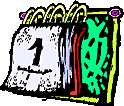With The Commentary of the RABAM


Bereishis (Genesis), psukim 6:9-11:32. The Aimishteh kvetches, and throws a tantrum.
Noah = Rest.
In this weeks Parsha, Parshas Noiach, we read of the great flood that destroyed the entire civilized world. It rained. It poured. Forty days and forty nights. People forgot to wear their boots. All the umbrellas turned inside out in the wind. The newspaper got soaking wet and couldn't be read. Uchinvei.
Forty days = And Moishe went up the mountain for forty days. That also ended in uchinvei. Coincidence?
Uchinvei = a geschrei un gekvetsh! You never heard such geyammer!
An obvious question arises: what did human society do that was so bad that the whole world deserved to be destroyed by the Reboinoisheloilum? This is a topic that is frequently addressed by Chazzal in their many, many ancient writings and e-mail discussion groups.
Chazal = Our sages of ages past. Who had an explanation for everything. We do not compare to them, as they were so much closer to Sinai than we are. Not to be confused with teevee evangelists, who only know everything. Or the Kansas Board of Education, who might know far less.
According to a famous medrish in the Sifre, the people of the world had all of the sudden become completely evil. They were killing each other right and left. They became depraved: Men were sleeping with sheep. Women were sleeping with well hung goats. Horses were sleeping with flounder. Businessmen were surfing porn during the work day. Children were discussing sports in shul. People were stealing each others' parking spaces. It was a real mess.
Medrish = A derivational examination of a subject, often meaning an explanation OR an examination of a textual posit.
Sifre = A Tannaitic commentary on Bamidbar and Dvarim, following the school of Rabbi Akiva, with later additions from the school of Rabbi Ishmael.
Rabbi Akiva = Rav Akiva Ben Yoisef, 50 CE – 135 CE. Teacher, talmudist, tanna, and martyr to the Name During the Bar Kochba revolt (132 CE -135 CE), twenty four thousand of his students died of a plague, which ended on Lag B’Omer (thirty third day of the counting of the sheaf. Omer = sheaf). When the revolt was crushed, the Romans tortured him to death. He is credited with creating the organizing structure of the the body of Jewish Law, later formalized in the redaction of the Mishnah by Rabbi Yehuda HaNasi in approximately 200 CE.
Lag b’omer = A good day for miracles, in the same way that the 17th of Tammuz (also occuring at one third away in time, other direction) is an excellent day for eicha rabah.
Rabbi Ishmael = A contemporary of Rabbi Akiva, who held that the halacha concerning incest may not be explained before three people, nor the creation mythos before two. The law follows Rabbi Ishmael.
Rabbi Ishmael was an ecstatic visionary, who is much quoted regarding the nature of the Aimishteh. And a prolific writer. Mechilta, mechilta, mechilta.
Or, as the noble lady said to the author of Decline and Fall, “scribble scribble, Mister Gibbon, scribble scribble”.
However, the Sifsey Chachomim rejects this medrish, calling it "the stupidest thing since New Coke." According to the Sifsey Chachomim, the people of that generation were no better or worse than they are today. Rather, the Aimishteh, after creating the world, was watching its every move, staring at the world for hours on end, and interacting with it whenever necessary; He was tracking the evolution of society, shaping its progress towards ultimate redemption (and a 50,000 point bonus). But just as the Mashiach was about to arrive on screen, the phone rang. And as the Reboinoisheloilum picked up the phone, He reached over to press "pause." But the system crashed and He was forced to hit the reset button. Damn that Microsoft!
Sifsei Chachomim = The Lips of the Wise, a supercommentary on Rashi by Rav Shabsai Bass (1641 – 1718), frequently printed in commentated chumashim (Pentateuchei), and much quoted by the more orthodox.
Rav Shabsai also wrote the Sifsei Yeshorim (the Lips of the Just), a bavuste bibliography of Hebrew books; the name is echoed in the title of a book by the Ramchal – Mesillas Yeshorim (the Paths of the Just), a book on piety which teaches how one may, by application and self-rectification, make oneself holy in attention to the divine.
Ramchal = Rabbi Moishe Chayim Luzzato, (1707 – 1746),Talmudist, kabalist and scholar from Padua, who moved to Amsterdam in 1735, then known as the Yerushalayim of the north, to get away from his critics among the chachmei italiyus, and later moved to the eretz kadoosh where he died of a plague.
He also wrote a book called Derech Hashem (an exposition of fundamental concepts), and Kalach Pischei Chochma (138 Gates of Wisdom; Kalach is an alphabetic numeral), which is a kabalistic tome which deserves greater reading than it gets.
Moshiach = The oiled one whose coming we await.
But the Da'as Zekainim disagrees. According to the Da'as Zekainim, Hakkadoshboruchhu actually decided to destroy the world on the second week of the New Year since the previous week, immediately following the Holiday cycle of Roish Hashanah, Yoim Kippur, Sukkois, and Simchas Toirah, half the shul didn't show up to hear Parshas Beraishis, staying home to overcome "shul fatigue". And while He was perturbed that the people threw their phoney Teshuvah (repentance) out the window, He was incensed that they let half of that good kiddish go to waste.
Da’as Zekanim (mi Baalei Toisfois) = A collection of writings of 12th and 13th century Tosafists. The name means wisdom (da’as) of a multitude (zekanim – the seventy sages of the Sanhedrion, being also a reference to an inclusive plurality, or an epitome of a group). The wisdom of seventy among the masters of annotation.
Rosh Hashana = The head of the year, new year.
Yom Kippur = A day of waving chickens over our heads in atonement, from which we need dry cleaning, that was my best shtreimel, dammit.
Sukkos = A week of plastic shopping bags over my second-best shtreimel, while we ‘live’ in a gamliche shed with only half a ceiling out on the fire-escape, getting rained on, coughing – and it’s a blessing to have guests while doing this! Good, let them sit out there, I’m going inside for some cake.
Simchas Toireh = I could have danced all night, I should have danced all night, instead I wanted more. A case of Glenfiddich? Oh, my head!
Shul fatigue = Three whole weeks of mussar! Three whole weeks of mussar! Three whole weeks of mussar! Of course we partied like Cossacks on simches Toireh.
If I have to listen to Rav Lazer read that tserdraite maise about the seven days again, I’ll give him one! He should have those days in bod, And no, I really can’t face chapping a fress with the Fitzpatriksteins and their screaming brood, just toss out the remaining shrimp. Nobody should have seventeen kinderlech, its obscene.
My shver will be there too? Sure, nobody ever invites that shtik goi anywhere, he has to come shnor some kiddish? I’m not going, I tell you. I’ll just watch some cartoons. Or Reb Robertson, volume low.
Some other suggested reasons:
- According to the Toirah Temimah, the people deserved to die because they insisted on paying retail.
Torah Temimah = A Torah anthology and commentary by Rabbi Baruch Ben Yechiel Michel HaLevi Epstein (1860-1942). It has the text of the Torah- and on the bottom of each page quotes all the Talmudic and Midrashic sources relating to the text above.
The nineteenth Psalm says, "Toras Hashem temimah, meshivas nafesh - the Torah of the Aimishteh is perfect, (it) restores the soul."
- According to the RI, the people regularly ate food with Triangle K supervision, and once had a cup of coffee at a place with no rabbinical supervision whatsoever. (If this pshat is true, global destruction was too good of a punishment for them!)
The RI = Rabbi Yitzhak Ben Avraham of Dampierre (12th. Century), nephew of Rashi's einiklach Rabbenu Tam (Rabbi Yakov Ben Meier, 1100 - 1171), Ribam (Rabbi Yitzhak Ben Meier, late tenth to mid eleventh century), and Rashbam (Shmuel Ben Meyer, 1083 - 1174).
Triangle K supervision = Kefirah!
- The RITVAH suggests that the Reboinoisheloilum was actually upset that the people weren't murderous enough. Sure, they were killing, but they weren't doing it "lishmah". He cites this as proof that Israel should elect an Ultra-Orthodox, Ultra Nationalist Taliban-like government in the next election.
Ritva = Rav Yomtof Ibn Assevili (approximately between 1350 and 1450 CE), a disciple of the Ra'ah (Rav Aharon Ha Levi, b. 1235, a Talmud commentator), head of the academy in Seville, a Halachic authority and important commentator on the Talmud.
Elect an ultra-orthodox, ultra Nationalist etc. = headquartered in Hebron, of course.
Damn hippies.
Finally, the REEBOK takes a totally different approach. He says that the world wasn't really destroyed. It was simply made to look that way so that the Aimishteh could collect on the insurance.
The REEBOK = A lineal descendant of Yochanan Ha Sandlar. Emmes.
Collect on the insurance = So collect already! This place is a mess! Balagan!
It is often pointed out by academic scholars that the Toirah's story of Noiach is paralleled by similar tales in Mesopitamian lore and other Near Eastern texts. The most famous of these is the epic of Gilgamesh. However, in Bab Basra, Rav Ashi was actually the first to note the extreme similarity between the story of Noiach and another epic cultural touchstone, Gilligan's Island.
Mesopotamian lore = The legends and mythologies of Babylon, through which our ancestor the wandering Aramean passed on his way to the land that the Aimishteh would give to his descendants, and in which his descendants spent many years in exile. The language spoken in Bavel was Aramaic, and it seems logical that much of the folklore and haggadah of the natives should have percolated into the consciousness of Jews over the centuries.
Mesopotamia = The land between the rivers. Modern day Iraq. Now note that while Babylon extended north into Syria, Syria (Assur) is a term that included the lands to the coast (Lebanon), to the mountains (Kurdistan), and extended at times all the way past Baghdad to the borders of Persia. Both terms, more or less, described that portion of the Levant which was NOT the holy land, though the Israelites and Asuri would often differ of opinion about the exact border, disputing particularly about Moab, Ammon, and Lebanon up to the Litani river.
Gilgamesh = Mesopotamian superman, primal hero, who fought the gods and survived a flood. Show off.
Baba Basra = One of the three Baba tractates in the Talmud, dealing with civil law.
Gilligan’s Island = An insular television studio set, upon which an ark landed, with a diverse multitude, who faced terrible loneliness and despair, and angst, due to their being alone, alone, so utterly alone.
Do not drop acid while studying this epic.
Like Gilligan, Noiach initially set out for a three hour tour. But before he knew it, he was forced to reestablish the human society he once knew. And like Gilligan, Noiach was set adrift in the company of a small group of people.
The RAN asks: Who in the Gilligan story is the true counterpart of Noiach? I would have thought that it would be the Skipper, who piloted the boat, in which case the epic tale should be call Skipper's Island. But the RAN points to the conclusion of the Parsha, which alludes to Noiach being violated by his son, Chum, and suggests that just as Noiach was violated by his son and the Parsha is named after him, so Gilligan was frequently violated by the Skipper, and therefore the epic tale is named after him. This, the RAN points out, is the reason Gilligan always insisted upon sleeping on the top bunk.
The RAN = Rabbeinu Nisim ben Rav Reuven Girondi (d. ~1380), whose supercommentary on the mefarsh of the Rif (Rabbi Yitzhak El Fassi, 1013 – 1103) is printed in the back of the Gemoro, along with the Rosh and the Rif.
Bereishis (Genesis) 9:20-25 is one of the most twisted stories in the Bible. Noah plants a vineyard, gets shikker off its wine, flakes out naked in his tent and is seen by his son Ham who tells his two brothers. (Ed.: There is also Midrashic commentary suggesting that Ham actually sodomized his father Noah. No kidding!) When Noah sobers up he knows what Ham did and curses his grandson Canaan who was not even there. How very Freudian.
The Aimishteh decided that THIS family was worth saving?!?!?! Amazing.
(A separate machloikess (Rabbinic debate) between Rabbi Yehoshua and Rav Yoinasan on who was hotter -- Ginger or Marianne -- need not be discussed here.)
In our day we are forced to ask: If the Aimishteh brought global destruction before, why can't it happen again? We are evil. We have terrorism and endless war. We have tax fraud and embezzlement. We have political corruption. We have moral inconsistency and selective application of the law and ethical values, tinged with religious self-importance. Are we not worthy?
I am reminded of a maiseh shehoya. The Rabbeinu Tam was in downtown Lublin, delivering a shiur on the subtleties of Smicha, rabbinical ordainment. As he was elaborating in great detail on the various religious laws, a middle aged man wearing train conductor overalls called out, "But Rabbi, what about ordaining women as rabbis -- can we do that?"
Rabbeinu Tam = Yacov Ben Meir, 1100 - 1171. A grandson of Rashi (Rabbi Shlomo Yitzhaki, 1040 - 1105), and the brother of Rashbam (Rabbi Shmuel Ben Meir, 1083 – 1174) and Ribam (Rabbi Yitzhak Ben Meir, late eleventh century to mid-twelfth).
Vi sogt man ‘anal retentive’ oyf mamaloshen?
Meise she hoyo = A tale from life, cited as an example, or to illustrate a point.
The Rabbeinu Tam glowered down at the man and responded, "Son, ordaining women as rabbis is like getting a PHD out of the phone book. Just please don't tell my wife I said that." His wife, of course, was the Cantor at the Hebrew Institute of Prague, who was pulling down six figures so that the Rabbeinu Tam could go around writing Tfillin that no one wanted to buy.
Tfillin that no one wanted to buy = There are two types of tfillin, one containing the rolled up parchments in the order approved of by Rashi, one following the order prescribed by Rabbeinu Tam, who out of this molehill of an issue made a veritable Har Sinai. Many modern Chasidim when wearing tfillin wear both styles, one after the other, thus hedging their bets. Which is kind of like going to confession before attending shul.
The Baal HaTuretz held that Rabbeinu Tam tfillin are pointless without a nice suit of Rabbeinu Tam shatnez, and in any case, Milan determines what is geshmak, no one listens to the French anyway.
The Rabbi of Prolicz opined that two kinds of tfillin are merely a way of showing the entire shtetl what a macher you are, that you can afford TWO sets of tfillin, hoohah!
Better you should buy another set of SHAS for the yeshiva library, show-off!
Are we truly better or worse than our ancient ancestors? Is our stated quest for peace a value or a fault? Is the changing role of women progress or moral corruption? Is near-total freedom of expression liberation or tyrany? Is our preparedness for war self defense or self destruction? I get cross-eyed just thinking about it; now I have to lie down.
So, are we no less worthy than our ancestors to have the full loving attention of the Aimishteh manifested by having the world destroyed in one fell swoop? Well, judging by the latest headlines, we may indeed be worthy in the eyes of the Lord. So if I were you, I would stay home from shul this week, order in some traif Chinese, and spend the day watching that new 52 inch high definition TV you'll pick up on the way home. Just be sure to put it on your Visa or American Express card. Based on how things are looking these days, I don't think you will ever have to worry about paying the bill.
Visa or American Express = Kefirah. The credit version of Treifah. Except for expenses at tax-time.
Ah gutten Shabbos, you Minuval.



